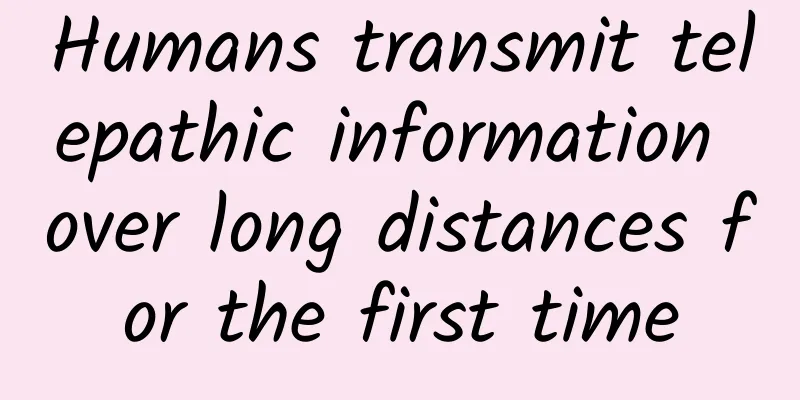Humans transmit telepathic information over long distances for the first time

|
Brainwave sensing devices can 'telepathically' control helicopters and characters in computer games, and research has now gone a step further, with a man in India able to send a message to a colleague in France using only his brainwaves. The researchers used an electroencephalography helmet to record the electrical activity of activated nerve cells in the brain and converted the words "hola (hello)" and "ciao (goodbye)" into binary. In the electroencephalography, the brain currents associated with different thoughts are input into a computer interface, and the computer then analyzes these signals. In this latest research report published in the journal "Public Library of Science One" this week, the researchers decided to use another person's brain instead of a computer interface to receive these signals. In initial tests, the Italian greetings were sent from a volunteer in Thiruvananthapuram, India, to Strasbourg in northeastern France, where a computer translated the signals and used electrical stimulation to input them into the recipient's consciousness. The information appeared as a flash of light in their vision, which was sequential, allowing the receiver to decode the information in the message. Later, the researchers conducted a similar experiment and successfully transmitted the thoughts of testers in two different locations, one in Spain and the other in France. The second experiment showed that the total error rate was only 15%, 5% on the encoding side and 10% on the decoding side. It is reported that this technology was jointly developed by the University of Barcelona, France's Axlum Robotics, Harvard Medical School, and Barcelona Star Laboratory. The researchers note that this is the first time humans have sent information to each other "almost directly" through their brains, and we can expect that in the near future computer systems will be able to interact directly with the human brain in a smooth way, achieving computer-brain and brain-brain communication. Human-brain interaction technology has attracted the attention of scientists. In May this year, German scientists conducted an experiment showing that seven pilots used their consciousness to control flight with amazing accuracy. In June this year, researchers at the University of Oregon in the United States unveiled a device that claims to be able to monitor a person's thoughts in near real time. As a winner of Toutiao's Qingyun Plan and Baijiahao's Bai+ Plan, the 2019 Baidu Digital Author of the Year, the Baijiahao's Most Popular Author in the Technology Field, the 2019 Sogou Technology and Culture Author, and the 2021 Baijiahao Quarterly Influential Creator, he has won many awards, including the 2013 Sohu Best Industry Media Person, the 2015 China New Media Entrepreneurship Competition Beijing Third Place, the 2015 Guangmang Experience Award, the 2015 China New Media Entrepreneurship Competition Finals Third Place, and the 2018 Baidu Dynamic Annual Powerful Celebrity. |
>>: Apple reveals top 10 reasons why apps are rejected from the App Store
Recommend
How to make the word count of Apple APP title reach 100+? Use these two tips!
It is often found that the titles of certain weir...
Apple restarting iPhone X production may not be a good idea
[[250541]] Image source: Visual China As early as...
Short videos + full links, a new way of marketing movies in 2020
2020 was a turbulent year for the film industry. ...
Most Unreliable iPhones and Android Phones: Samsung Tops the List
The price of iPhone is not cheap, so what about it...
Where will Uber go in the future without Kalanick at the helm?
According to foreign media reports, Uber's in...
Recipes for home cooking, 400 home cooking recipes HD e-book
It selects 400 classic and fashionable home cooki...
Shi Xuemin - Acupuncture and Moxibustion Tianjin University of Traditional Chinese Medicine 123 Lectures
Shi Xuemin - Acupuncture and Moxibustion Tianjin ...
3 pitfalls of community operation
Community products have natural advantages in use...
5 steps for integrated marketing promotion across the entire network, this is the normal approach!
As the company develops and its market share incr...
Earn 10,000 yuan a day from illegal income? What are some ways to make money quickly in a day?
He said he has 760,000 QQ groups, but QQ groups d...
The disappearance of iPad mini has put the 7-inch tablet market in a bit of an awkward position
Yesterday, Apple held a press conference to offic...
AE animation class: The secret of keyframes - how to adjust the animation rhythm that makes people happy
: : : : : : : : : : : : : : : : : : : : : : : : : ...
Hu Q&A: Can a puppy understand what you say?
"Come on, come on, puppy, puppy, suck, suck!...
Tesla's autopilot is unreliable. An accident only takes 1/8 of a second and leaves no trace.
With the development of technology, the driving a...









